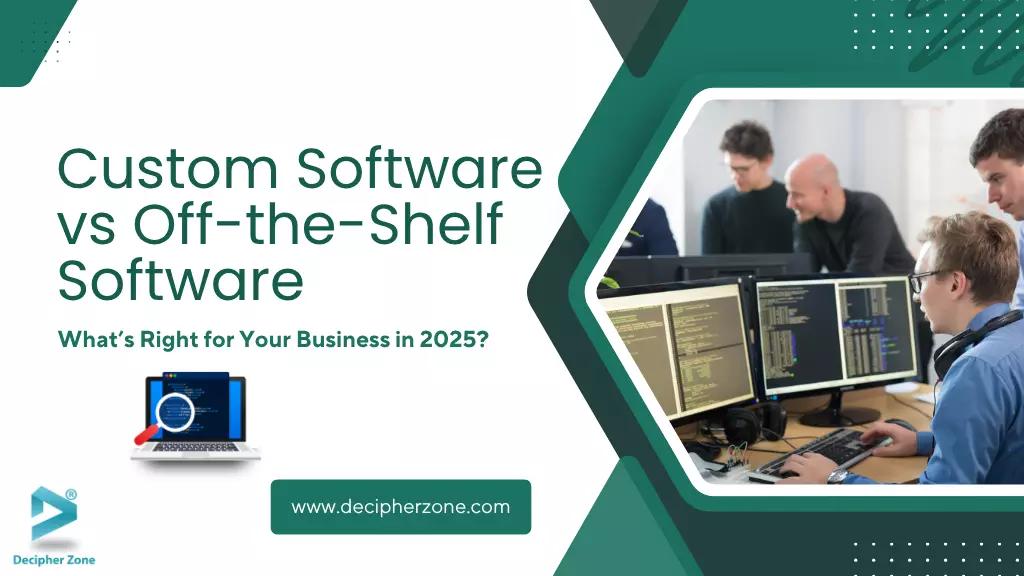You may be wondering whether to choose custom software or off-the-shelf solutions. Depending on your business requirements, goals, these software are made. You may not be familiar with these terms and how to choose? Read this blog as it covers all the aspects from basic to benefits, disadvantages, factors which are needed to consider while developing a software, the major difference between custom and off-the-shelf software, practical applications of these two types of software solutions.
Software is the very engine that drives business success. From a startup founder sketching your first product idea to a CEO of a scaling enterprise navigating digital transformation, the build or buy software dilemma has likely landed on your desk.
Custom Software vs Off-the-Shelf Software: Which is best for your business?
The decision of choosing custom software development or off-the-shelf software has been more critical than ever! The right software can streamline operations, enhance customer experiences and boost your bottom line. The wrong one? It could drain your budget, frustrate your team and stunt your growth.
So again, the question is should you go for a custom-built software solution tailored to your unique business goals or opt for an off-the-shelf product that’s ready to deploy out of the box? To consider one thing that is each one comes with its own promise and challenges.
This blog is focused on making an informed choice which is not only trending but aligned with your business requirements, industry demands and long-term vision.
Understanding the Basics of Custom Software vs Off the Shelf Software
What is Custom Software?
Custom software is an application built exclusively for an organization, designed to solve the business’s specific challenges, integrate seamlessly with the processes and scale as the enterprise grows.
Read: Web Application
Custom software is like walking into a high-end tailor’s shop. You are not just picking something off a rack but you are creating a garment from scratch, with every measurement, stitch and fabric choice reflecting your personal taste and needs. This is exactly what custom software offers but in a business sense.
What is Off-the-Shelf Software?
Off-the-shelf software comes pre-packaged with general features intended to solve common business problems. Some of the excellent examples of these tools include Microsoft 365, Trello or Shopify.
For example, Off-the-shelf software is like buying a shirt at a popular store, affordable, looks good and you can wear it the same day. A readymade, mass market software solution designed for a wide audience across various industries.
Custom Software vs Off-the-Shelf Software: The Pros and Cons
Custom software and off-the-shelf software are not just black and white when choosing. Both come with unique sets of strengths and shortcomings and understanding these can be time-saving, budget-friendly and turn plenty of future headaches into opportunities.
Here are some of the advantages and disadvantages of custom and off-the-shelf software in a clearly defined manner. Whether you prioritize cost-efficiency, speed of implementation, scalability or control, this comparison will help you see the paths and which one aligns with your goals in 2025 and beyond.
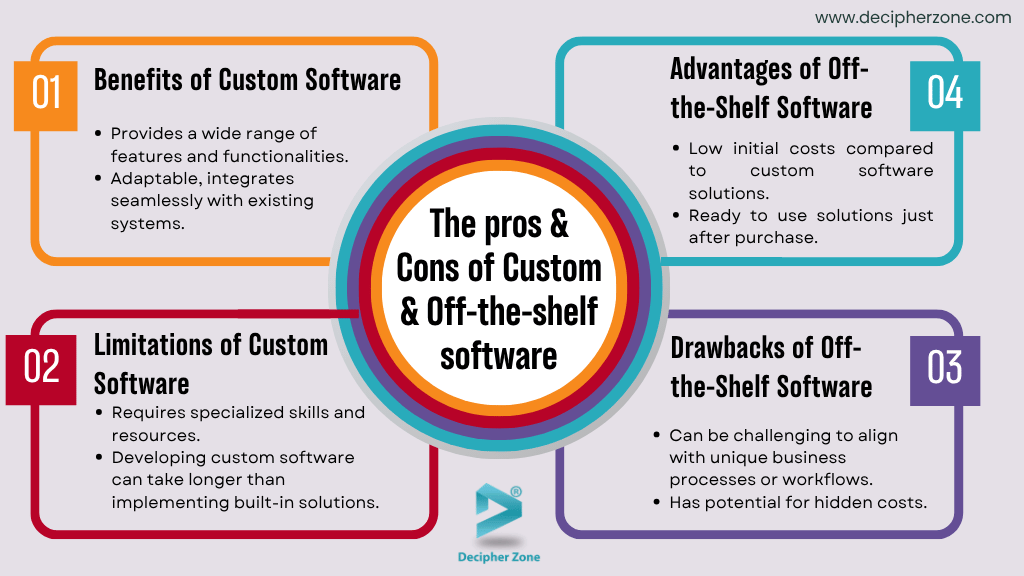
Benefits of Custom Software Development
-
Provides a wide range of features and functionalities.
-
Adaptable, integrates seamlessly with existing systems.
-
Often built with specific security measures to protect sensitive data and mitigate risks.
-
Offers customized workflow and automation to streamline processes.
-
Facilitates ongoing support and maintenance to remain up-to-date and aligned with business needs.
Limitations of Custom Software Development
-
Requires specialized skills and resources.
-
Developing custom software can take longer than implementing built-in solutions, ultimately delaying time-to-market.
-
Complex projects can be prone to delays and cost overruns if not carefully planned.
-
Challenges with support, maintenance or future upgrades, if choice for the wrong software development partner.
Want a fully tailored, scalable solution? Explore our Custom Web App Development, Mobile App Development, ERP, CRM, or CMS offerings.
Advantages of Off-the-Shelf Software Development
-
Low initial costs compared to custom software solutions.
-
Ready to use solutions just after purchase and installation.
-
Offers community forms, tutorials and readily available support resources.
-
Provides wide availability and choice of pre-built software to address various business needs.
-
Lower technical expertise is needed for installation and basic use.
Read: web application development
Drawbacks of Off-the-Shelf Software Development
-
Can be challenging to align with unique business processes or workflows.
-
Some experts can find off-the-shelf software difficult to integrate with existing systems.
-
Has potential for hidden costs like ongoing subscription fees, maintenance and upgrades.
-
Controlled upgrades as future development, updates or bug fixes have limited influence.
-
Not ideal for complex or unique business processes due to requirements for specialized features.
Read: Custom Pricing Software Development
Key Factors to Consider When Developing Software in 2025
Choosing the right software solution isn’t just a technical decision but a strategic one. If you’re looking for a growing mid-sized business or large scale enterprise and are confused in your choice between custom and off-the-shelf software. You should be guided by a clear understanding of your business dynamics, future goals and operational complexities.
Here are the critical factors every business should weigh before deciding the software development:
1. Business Size and Type
Different organization size, structure and complexity play a major role in this decision like startups and small enterprises have limited budgets and tight deadlines. They may find off-the-shelf solutions attractive due to faster deployment, minimal setup and low upfront costs. These tools can streamline basic operations and help teams to stay agile in the initial stages.
Mid-sized and large organizations usually deal with intricate workflows, industry-specific compliance and legacy systems. They prefer custom software, a smarter, long-term investment as they offer flexibility to customize specific to the business needs. Custom tools can mirror their processes precisely and support internal teams more efficiently.
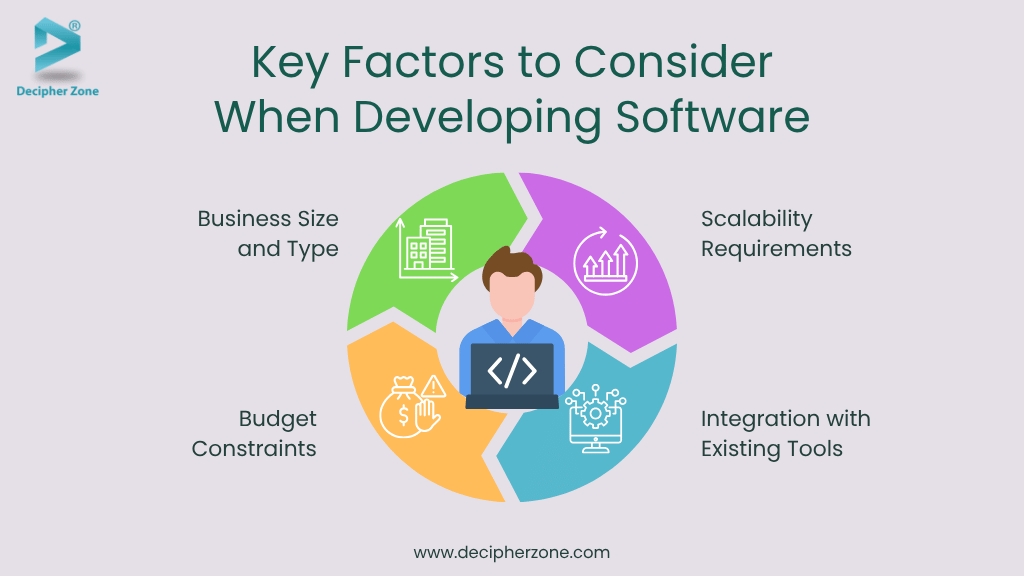
2. Budget Constraints
Businesses are getting smarter about spending. The choice isn’t just about the cheapest option upfront, it’s about total cost of ownership.
Custom Software: Customized solutions may require a larger initial investment but can be led to cost savings in the long run.
Off-the-Shelf Software: Software can be budget-friendly at the start but need to consider hidden costs such as subscription renewal, add-ons, user limits and potential productivity loss due to limited customization.
3. Scalability Requirements
Custom Software: Scalability is in how you design it to support more users, integrate with future tools or accommodate growing data volumes. This provides no surprise overhauls or costly replacements down the line.
Off-the-Shelf Software: Software can limit the business expansion. Many are built with use cases and while some offer upgrade plans. These might not keep up with the unique growth trajectory or evolving demands.
Need something fast and flexible? Our On-Demand Solutions are built for speed, simplicity, and success.
4. Integration with Existing Tools
From CRMs and ERPs to third-party APIs and IoT systems, integration is non-negotiable.
Custom Software: It is developed specifically for your existing tech stack, providing fewer compatibility issues and smoother user experience. It ensures data consistency and minimizes operational silos.
Off-the-Shelf Software: Facilitates limited integration capabilities. Incompatibility with existing tools can lead to additional expenses for connectors, middleware or even manual data transfer, each of which can disrupt efficiency.
5. User Experience (UX)
Offers the advantages of being built around the business’s goals and preferences in custom software. Off-the-shelf software requires teams to adapt to them.
.avif)
6. Data Ownership & Privacy
Mainly, Custom solutions offer more control over how data is stored, processed and protected, especially in regulated industries.
7. Competitive Differentiation
A software system can serve as a strategic asset by providing features or capabilities that are difficult for competitors to replicate using standard tools, enhancing an organization's position in the market and creating unique value for your customers.
Difference Between Custom Software & Off-the-Shelf Software
|
Criteria |
Custom Software |
Off-the-Shelf Software |
|
Cost |
No ongoing license fees with high initial investment. |
Lower upfront cost, but potential for ongoing subscription and upgrade fees. |
|
Customization vs Convenience |
Fully tailored to unique business needs and operations. |
Convenient and ready-made, but limited customization options. |
|
Security and Compliance |
Built with industry-specific security and compliance in mind. |
Generic security features; may not meet specialized compliance standards. |
|
Scalability |
Designed to grow and scale alongside your business needs. |
Limited scalability, upgrades may require switching plans or platforms. |
|
Long-Term ROI Analysis |
High ROI over time due to efficiency, ownership, and adaptability. |
Lower upfront cost, but may become costly with add-ons, workarounds, or replacements. |
|
Time to Deployment |
Longer development time due to design, testing, and implementation. |
Instant or near-instant installation after purchase. |
|
Integration |
Seamless integration with existing tools, databases, and workflows. |
May require additional tools or custom workarounds to integrate effectively. |
|
Upgrades & Ownership |
Full control over updates, features, and long-term roadmap. |
Dependent on vendors for updates, bug fixes, and future development. |
Custom Software vs Off-the-Shelf Software: Choose ad per Use Cases and Industry Applications
The requirements of the software depends on the industry or sectors like some sectors focus on speed and affordability, some focus on compliance and integration and for some, scalability is non-negotiable. Industries have different needs, processes and levels of complexity which directly impact which software makes more sense and are most suitable.
Here is the list of industries that benefit and thrive the most from custom and off-the-shelf software:
Best Industries for Custom Software Development
1. Healthcare
For advanced features like patient data management, telehealth integration and strict HIPAA compliance, custom software is ideal for hospitals, clinics and healthtech companies. Some of these are:
-
Electronic Health Records (EHR) Systems: Securely store patient data, offer accessibility and keep it up-to-date without all the paperwork.
-
Telemedicine Platforms: Conducting reliable virtual consultations with patients anytime, anywhere.
-
Patient Portals: Facilitating control to patients over appointments, records and test results to provide smooth workflow.
Read: Cost Estimation of Custom Software Development
2. Logistics & Transportation
Logistics enterprises require tailor-made solutions for fleet management, delivery tracking, warehouse automation and supply chain optimization. These software can easily adapt real time data, multiple vendors and location-based services. The practical applications can be used for:
-
Fleet Management: Offers real-time fleet tracking and predictive maintenance to track vehicles, monitor performance and cut fuel costs.
-
Route Planning and Optimization: Plan routes that are fastest and most cost-effective and keep deliveries on schedule,
-
Warehouse and Inventory Management: With smarter inventory control, automating stock tracking and reducing waste.
-
End-to-End Shipment Tracking: Provides transparency into every shipment throughout the supply chain.
-
Custom Compliance Software: Compliance or regulatory requirements made easy with custom compliance software as it automates documentation and reduces errors.
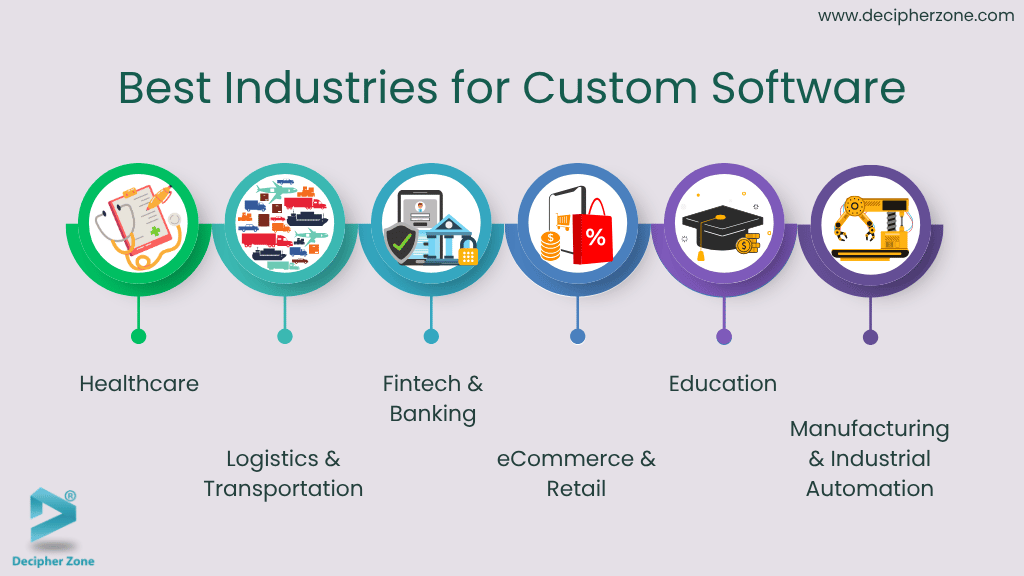
3. Fintech & Banking
Custom software in the fintech industry strictly requires security, regulation compliance and custom algorithms. These solutions offer to help you develop secure and scalable platforms specifically for digital banking, fraud detection and personalized finance management. Here’s more how it can be used:
-
Custom Banking Apps: Offering users to manage their money and banking services faster, safer and more intuitively.
-
Trading & Investment Platforms: Providing customers to automate trades, analyze markets and make informed decisions in real time.
-
Loan & Mortgage Processing: With AI-driven automation the workflow can be simplified, speed up approvals and reduce paperwork.
-
AI Fraud Detection Systems: Offering automated spotting suspicious transactions instantly and alerts to stop fraud before it even happens.
-
Predictive Analytics for Financial Planning: Analyze using advanced tools to turn data into insights and make well-informed financial decisions for the future.
Looking for expertise in a specific stack?
4. eCommerce & Retail
Custom platforms facilitate personalized user experience, dynamic pricing, integrated inventory management and muilti-channel sales tracking for online retailers to increase sales. Here are some examples to consider:
-
Custom E-commerce Platform: Providing mobile and web apps that are fast, flexible and built for growth.
-
Omnichannel Retail Software: Offering a platform to connect online, online and in-store shopping, making a frictionless user experience.
-
Dynamic Pricing Algorithms: Analyze the market and adjust the prices in real time based on the market demands, competition and market trends.
-
Smart inventory & Order Management: AI-powered automation providing real time state of inventory to keep stock levels optimized and fulfill orders faster.
5. Education (Edtech)
Features like curriculum customization, real time student tracking, gamification learning tools and secure exam proctoring are necessary to scale educational institutions and platforms. Here are more ways:
-
Custom Learning Management Systems: Platform offering tailored courses, track students’s progress and keeping the engagement learning.
-
Virtual Classrooms and Online Learning Platforms: Providing the freedom of accessing, collaboration and interactive lessons at any time and any location.
-
Student Information Systems: Managing records, attendance and performance in real time in one centralized system for convenience.
-
Interactive Learning Tools: Adding features to making education more engaging with gamified lessons and hands-on experiences.
-
AI-Powered Adaptive Learning: Providing flexibility with personalized learning paths leveraging AI, adjusting to each learner’s pace and needs.
Building an online store? Start strong with our eCommerce Development Services designed to scale.
6. Manufacturing & Industrial Automation
To streamline manufacturing tasks such as production line optimization, predictive maintenance and integration with IoT devices. Generic software offers features if you need to manage complex supply chains, production lines and inventory that are rarely out of the box. Here are some practical uses:
-
Real Time Production Monitoring: Keeping track of every stage of development, spotting bottlenecks and operations to run smoothly and at full speed.
-
Workforce Management: Manages tasks, analyze and track performance and optimize schedules keeping all at one place.
-
Predictive Maintenance: Leveraging AI-driven maintenance alerts to spot and fix issues before they begin to happen.
-
Inventory Management: With real time inventory tracking to keep stock levels optimized and prevent shortages.
-
Supply Chain management: Streamline logistics, minimizes delays and ensures the supply chain remains operational.
Best Industries for Off-the-Shelf Solutions Development
1. Small Businesses & Startups
Off-the-shelf software facilitates tools such as accounting software, CRM platforms and marketing automation help them get up and running faster without heavy investment. Businesses and startups often find this suitable to move fast and stay lean.
Read: Custom Mobile App Development Company for iOS
2. Freelancers & Solopreneurs
Solutions like Trello, QuickBooks, Canva, etc are the most reliable for managing invoices, project tracking or basic customer communication. Freelancers and solopreneurs are benefited from these affordable and easy to use software solutions.
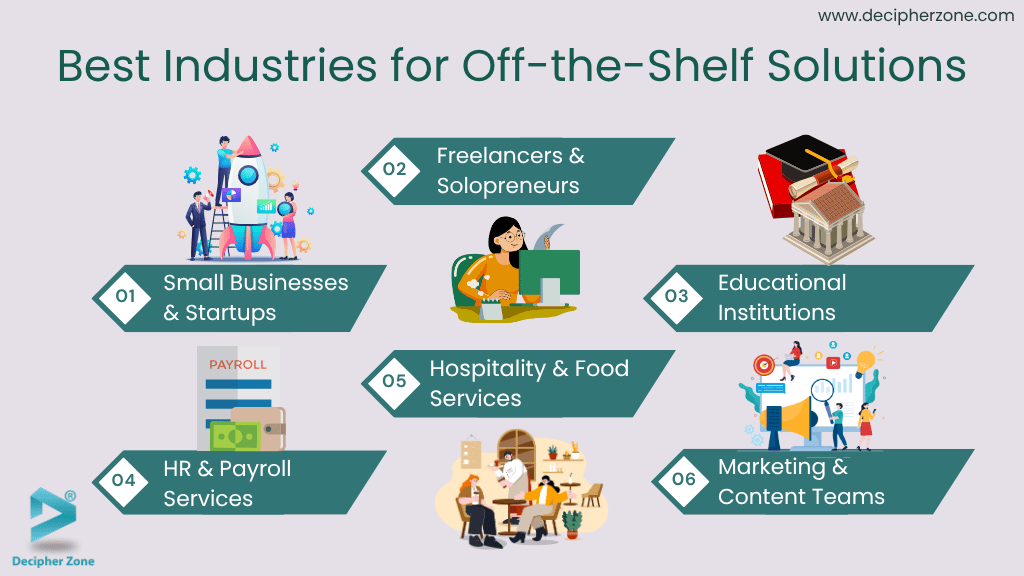
3. Educational Institutions
Leveraging LMS platforms can be beneficial for schools, universities and other educational institutions expanding their traditional curriculum without the need for deep customization. These platforms include Google Classrooms or Moodle.
4. HR & Payroll Services
HR involves functions such as attendance tracking, payroll processing and employee onboarding. Off-the-shelf software will be suitable for these kinds of sectors as it requires minimal setup. Some of these platforms like Gusto, BambooHR or Zoho People.
5. Hospitality & Food Services
For restaurants, hotels and cafes, off-the-shelf solutions like pre-built POS software, reservation tools and food delivery integration can be specifically designed. This industry can rely on these tools as it streamlines and automates workflows.
6. Marketing & Content Teams
Some of the off-the-shelf platforms/ software facilitates plug and play functionality to effectively manage campaigns, automation and analytics without the need for custom development. These tools involve HubSpot, mailchimp, Hootsuite, etc.
Prefer to hire top developers to extend your team?
-
Hire a Dedicated Developer tailored to your project.
How Can Decipher Zone Help in Building Custom Software and Off-the-Shelf Software
Decipher Zone offers an end-to-end custom software development process, designed to align perfectly with your business goals, operational challenges and growth strategies. From cutting-edge mobile or web apps, enterprise-level software, cloud computing services, legacy system modernization or a robust SaaS solution. Our team of experts can turn your vision into reliable, scalable and high-performing software that fuels success.
Want proof? Check out our Portfolio to see real-world results we've delivered for global clients.
Read: Custom Healthcare Software Development in South Africa
Here’s a breakdown why to choose Decipher Zone:
-
Proven expertise delivering tailored solutions for complex business challenges across industries.
-
We bring strategic data and technical proficiency to solve problems, overcome challenges and seize opportunities with smart and scalable software.
-
We truly understand your business needs, goals and limitations to evaluate and ensure every solution we deliver is aligned with what matters most.
-
We provide a perfect balance of quality and cost-effectiveness to ensure that your software is high value without sacrificing features and budget.
-
Industry experts to get the clear and complete information to access better and work as an extension of your organization.
-
To make your software solution efficient, secure and future-ready our professionals have access to the modern tools, resources and frameworks.
-
We build solutions that are easy to update, fix and expand, providing 24/7 support and help you expand as your business grows.
How to Choose Between Custom and Off-the-Shelf Software
-
Define Your Business Requirements: What specific challenges or processes do you need software to address?
-
Evaluate Your Budget: Can you invest upfront for custom, or do you need low entry costs?
-
Consider Scalability: Will your needs expand? Do you need software that grows with you?
-
Assess Integration Needs: What existing systems must the software connect with?
-
Make a Decision Based on Fit: Compare pros and cons to align with your strategic vision.
FAQs
-
What is the difference between custom and off-the-shelf software?
Custom software is an application built exclusively for an organization, designed to solve the business’s specific challenges, integrate seamlessly with the processes and scale as the enterprise grows. Whereas,
Off-the-shelf software comes pre-packaged with general features intended to solve common business problems.
-
How much does custom software development cost?
The cost of custom software development can vary from $15,000 and can rise to $2,00,000 depending on the various factors. These factors include the customization, complexity, development time, integration, tech stack and more.
-
How to build custom software?
The process of custom software development involves clearing defining goals and business requirements, plan a roadmap, develop and test, launch and ongoing support. Custom software development requires strict focus on clear communication, careful planning and user needs throughout the software development lifecycle.
-
How to handle data security in off-the-shelf software?
By utilizing Role-Based Access Control (RBAC), implementing multi-factor authentication (MFA) for an extra layer of security and regularly updating software and its components can keep the software away from data breaches, cyber attacks and disruption.
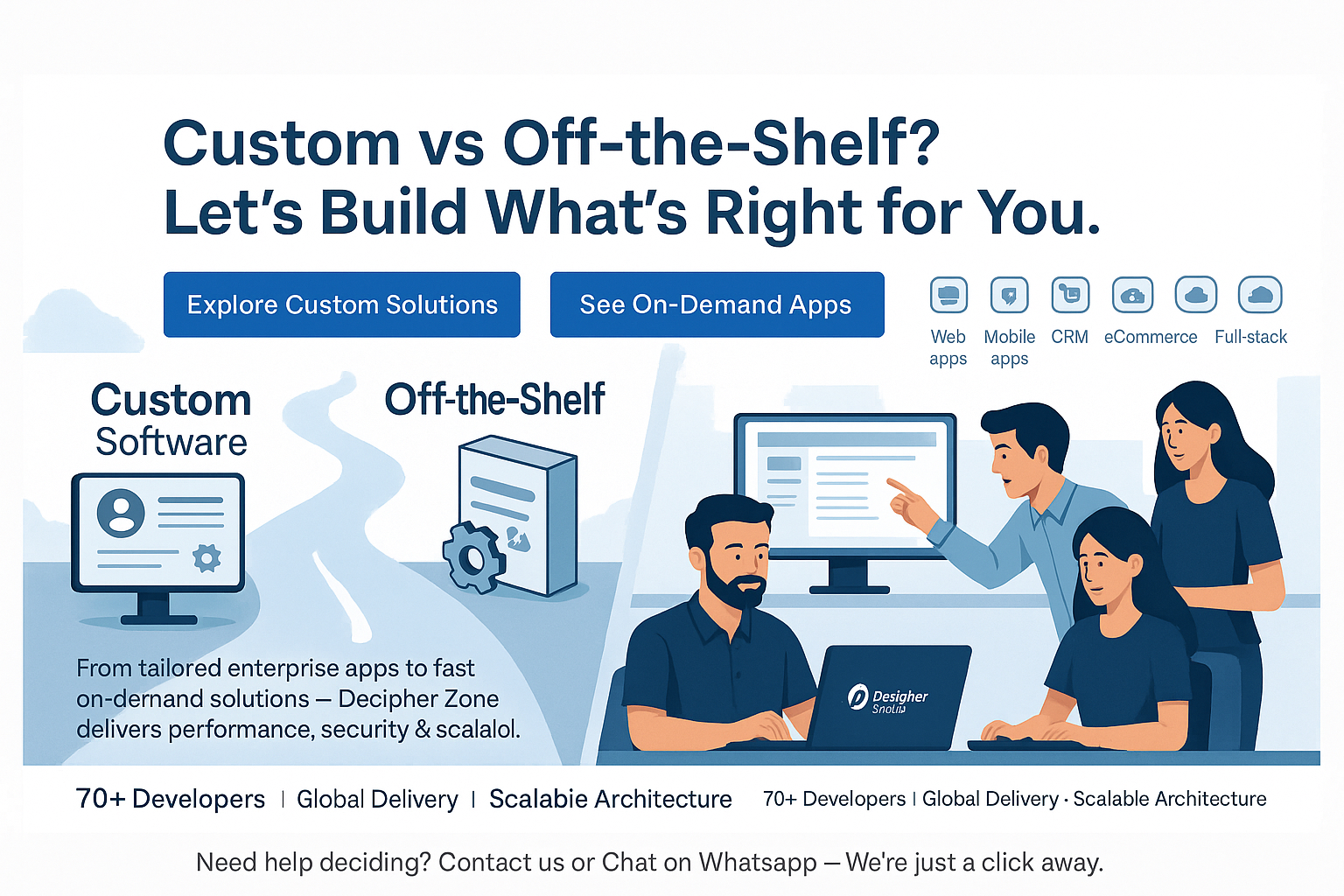
Interested in collaborating or outsourcing?
Join our Partnership Program and grow together.
📞 Still have questions? Let’s talk!
Introducing Decipher Zone Custom ERP
Our custom-built ERP system is designed to streamline your operations across inventory, HR, billing, and more. Built for flexibility and scalability, it integrates seamlessly with your tech stack and is accessible across Web, Android, and iOS platforms.
- ✔ Tailored modules for finance, HR, inventory, CRM
- ✔ Secure and GDPR-compliant
- ✔ Scalable architecture for growing businesses

